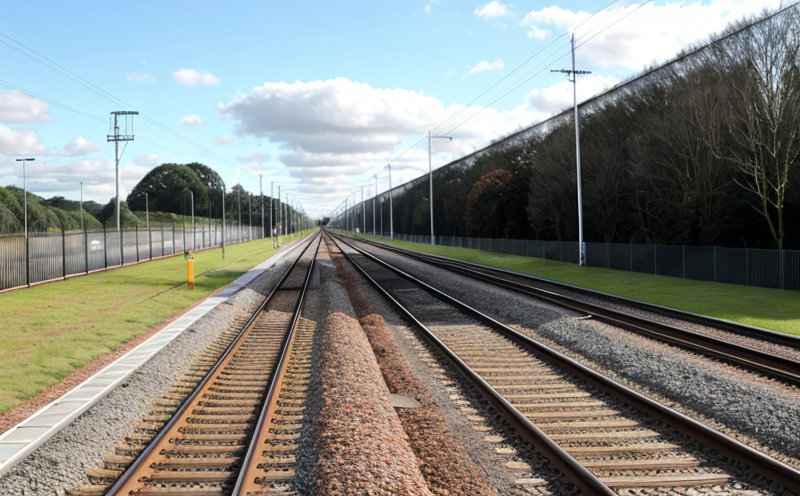EN 1097-2 Los Angeles Abrasion Testing of Ballast Stones
The EN 1097-2 standard specifies a method for determining the abrasion resistance of ballast stones, which are crucial components in railway and transportation infrastructure. These stones provide stability and drainage to track beds while resisting wear and tear from continuous traffic. The Los Angeles Abrasion test is particularly important as it helps ensure that the ballast stones used meet the required durability standards specified by international regulations.
The test procedure involves placing a specific quantity of crushed stone into a rotating drum, which simulates the abrasive action caused by wheel-rail contact and weathering over time. The specimen undergoes multiple cycles of rotation before being sieved to determine the loss in mass due to abrasion. This quantitative assessment allows for accurate comparison between different samples or batches of ballast stones.
The significance of this test extends beyond mere compliance; it directly impacts safety, longevity, and maintenance costs associated with railway systems. By ensuring that only high-quality materials are used, operators can minimize the risk of premature failures leading to disruptions in service. Additionally, understanding the abrasion properties helps in selecting appropriate grades of ballast for various applications, thereby optimizing performance.
Furthermore, the results from this test play a key role in quality control processes during procurement and manufacturing stages. They enable stakeholders involved in these operations to make informed decisions regarding raw material selection and process optimization. This ensures not only adherence to regulatory requirements but also contributes positively towards sustainable practices within the industry.
In summary, EN 1097-2 Los Angeles Abrasion Testing of Ballast Stones is a vital tool for assessing the abrasion resistance of ballast stones used in railway infrastructure. Its application provides critical insights into material quality and helps maintain safe, efficient transportation networks worldwide. Through rigorous testing methods, it ensures that only reliable products are utilized, ultimately contributing to enhanced operational reliability and cost-effectiveness.
Why It Matters
The durability of ballast stones significantly influences the overall condition and longevity of railway tracks. A well-maintained track is essential for safe and efficient transportation operations. Poor quality or poorly maintained ballast can lead to increased wear and tear on tracks, resulting in costly repairs and potential disruptions.
The Los Angeles Abrasion test plays a crucial role in identifying stones with superior resistance against abrasion caused by wheel-rail interaction. This ensures that only robust materials are incorporated into track construction, thereby extending the life of infrastructure components. Moreover, consistent application of this testing method across suppliers helps standardize quality standards globally.
From an economic perspective, adopting stringent abrasion testing procedures leads to reduced maintenance costs and extended service intervals for railway systems. Operators can allocate resources more effectively towards other critical aspects such as signal systems or rolling stock management rather than constant repair activities associated with inferior materials.
In conclusion, the EN 1097-2 Los Angeles Abrasion Testing of Ballast Stones is not just a compliance exercise but an integral part of ensuring robust railway infrastructure. By prioritizing this test, stakeholders contribute to safer and more reliable transportation networks that benefit both the industry and society at large.
At Eurolab, we pride ourselves on delivering unparalleled expertise in railway & transportation testing. Our state-of-the-art facilities equipped with advanced instrumentation enable precise execution of EN 1097-2 Los Angeles Abrasion Testing of Ballast Stones. Here’s why choosing us for your abrasion testing needs makes sense:
Accurate Results: Leveraging cutting-edge technology ensures accurate measurements and reliable data, providing confidence in decision-making processes.
Comprehensive Support: Our team comprises experienced professionals who understand the nuances of railway infrastructure testing. They offer guidance throughout your project lifecycle from initial consultation to final report generation.
Fast Turnaround Time: We recognize the importance of timely results, especially in dynamic industries like rail transport where schedules are critical. Therefore, we strive to deliver reports within industry benchmarks or even faster when possible.
Global Compliance: With our deep understanding of international standards such as EN 1097-2, we ensure that all tests meet the stringent requirements set forth by relevant authorities worldwide.
Cost Efficiency: By optimizing resource utilization and minimizing errors through precise testing methods, Eurolab helps clients achieve cost savings without compromising on quality.
Dedicated Services: Whether you require one-off tests or ongoing support for regular quality checks, our dedicated team stands ready to assist with tailored solutions that suit your specific requirements.
International Acceptance and Recognition
The EN 1097-2 Los Angeles Abrasion Testing of Ballast Stones has gained widespread acceptance and recognition across multiple countries due to its robustness and reliability in evaluating ballast stone quality. Many nations have adopted this standard as part of their national regulations governing railway construction and maintenance.
For instance, several European Union member states mandate compliance with EN 1097-2 for all new track installations. Similarly, countries like India, China, Australia, and South Africa incorporate similar abrasion testing protocols into their respective standards to ensure consistent quality across different regions.
The global acceptance of this test highlights its importance in promoting safety and efficiency within the railway sector. As more jurisdictions recognize the value of stringent abrasion testing, it reinforces the need for continuous improvement in ballast stone production processes globally. This standardization fosters interoperability between various rail networks worldwide, facilitating smoother international trade and collaboration among stakeholders.
Moreover, adherence to internationally recognized standards like EN 1097-2 enhances credibility and trustworthiness among clients, suppliers, and regulatory bodies involved in railway projects. It demonstrates a commitment to excellence and upholds the highest industry standards, which is crucial for maintaining competitive advantage in today’s global market.





